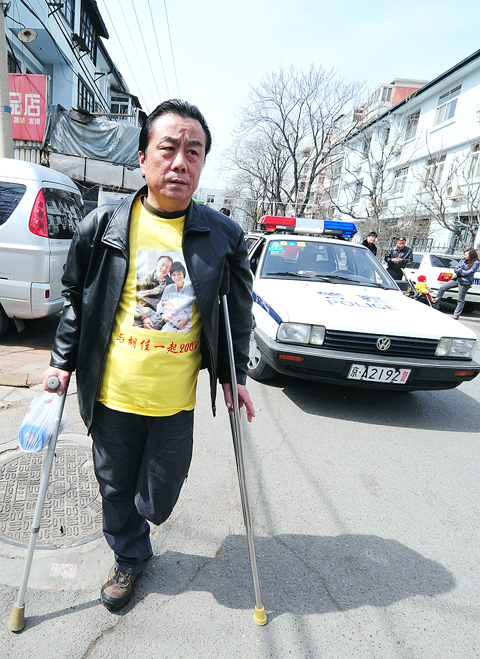Chinese dissidents reported being detained and harassed yesterday as authorities clamped down on the 20th anniversary of a reformist leader’s death that triggered the 1989 Tiananmen protests.
The anniversary is seen as the start of an ultra-sensitive period for Chinese Communist Party leaders as they will be forced to revisit the June 4 crackdown that killed hundreds, if not thousands, of people.
Qi Zhiyong (齊志勇), a well-known Chinese dissident who lost a leg when he was shot during the military crackdown, said yesterday he had been taken away by police.

PHOTO: AFP
“When I went out at seven o’clock to take my child to school, I was forced into a police car by state security police,” Qi said in a text message. “They have taken me to the outskirts [of Beijing].”
Qi said the detention was related to yesterday being the anniversary of the death of former communist leader Hu Yaobang (胡耀邦), who was purged in 1987 for his perceived weak response to student protests and died on April 15, 1989.
His death sparked calls for political reforms that led to the massive democracy protests in and around Tiananmen Square, which the Chinese military brutally quashed on June 4.
Other dissidents and a rights group also reported increased scrutiny yesterday.
Wang Songlian, research coordinator at activist group Chinese Human Rights Defenders, said a number of dissidents had told her of heightened tensions on the day of the anniversary.
“Today is a day when police have started putting people outside dissidents’ homes and following them,” she said, declining to immediately reveal their names before getting their permission.
“We have a number of people that have been subject to increased surveillance and some have been told not to go to meetings today where they could see other dissidents,” she said.
Jiang Qisheng (江棋生), a Beijing-based activist who was jailed for more than a year for participating in the 1989 protests, said police were watching him constantly in his native Jiangsu Province, where he had been staying for more than a week.
“They stand at the gate of my house guarding me without my permission and wherever I go they follow me,” he said by telephone.
“When I return to Beijing, I think it will be the same as it is getting nearer June 4,” he said.
Jiang, who was jailed again in 1999 after urging people to commemorate the 10th anniversary of the Tiananmen crackdown, said he had started coming under police scrutiny during the nation’s annual parliamentary session in March.
Some netizens, meanwhile, posted comments online about Hu, widely admired because he tried to rehabilitate the victims of the tumultuous Cultural Revolution and admitted mistakes in the handling of Tibet.
“The older generation’s opinion of him is good, it’s just a shame that afterwards at school we have not ever really heard of him,” said one posting on a popular Web portal.
Also See: Hong Kong students vote on Tiananmen motion
The Taipei Times ran an interview with Qi Zhiyong in its April 14 edition. Please see: The Tiananmen ache

WAITING GAME: The US has so far only offered a ‘best rate tariff,’ which officials assume is about 15 percent, the same as Japan, a person familiar with the matter said Taiwan and the US have completed “technical consultations” regarding tariffs and a finalized rate is expected to be released soon, Executive Yuan spokeswoman Michelle Lee (李慧芝) told a news conference yesterday, as a 90-day pause on US President Donald Trump’s “reciprocal” tariffs is set to expire today. The two countries have reached a “certain degree of consensus” on issues such as tariffs, nontariff trade barriers, trade facilitation, supply chain resilience and economic security, Lee said. They also discussed opportunities for cooperation, investment and procurement, she said. A joint statement is still being negotiated and would be released once the US government has made

Authorities have detained three former Taiwan Semiconductor Manufacturing Co (TMSC, 台積電) employees on suspicion of compromising classified technology used in making 2-nanometer chips, the Taiwan High Prosecutors’ Office said yesterday. Prosecutors are holding a former TSMC engineer surnamed Chen (陳) and two recently sacked TSMC engineers, including one person surnamed Wu (吳) in detention with restricted communication, following an investigation launched on July 25, a statement said. The announcement came a day after Nikkei Asia reported on the technology theft in an exclusive story, saying TSMC had fired two workers for contravening data rules on advanced chipmaking technology. Two-nanometer wafers are the most

NEW GEAR: On top of the new Tien Kung IV air defense missiles, the military is expected to place orders for a new combat vehicle next year for delivery in 2028 Mass production of Tien Kung IV (Sky Bow IV) missiles is expected to start next year, with plans to order 122 pods, the Ministry of National Defense’s (MND) latest list of regulated military material showed. The document said that the armed forces would obtain 46 pods of the air defense missiles next year and 76 pods the year after that. The Tien Kung IV is designed to intercept cruise missiles and ballistic missiles to an altitude of 70km, compared with the 60km maximum altitude achieved by the Missile Segment Enhancement variant of PAC-3 systems. A defense source said yesterday that the number of

Taiwanese exports to the US are to be subject to a 20 percent tariff starting on Thursday next week, according to an executive order signed by US President Donald Trump yesterday. The 20 percent levy was the same as the tariffs imposed on Vietnam, Sri Lanka and Bangladesh by Trump. It was higher than the tariffs imposed on Japan, South Korea and the EU (15 percent), as well as those on the Philippines (19 percent). A Taiwan official with knowledge of the matter said it is a "phased" tariff rate, and negotiations would continue. "Once negotiations conclude, Taiwan will obtain a better